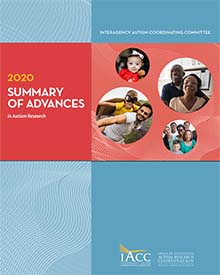June 7, 2022 | For Immediate Release
2020 IACC Summary of Advances Highlights New and Impactful Autism Research

The Interagency Autism Coordinating Committee (IACC) has released its 2020 Summary of Advances in Autism Research. This publication provides short, plain language summaries of the top 20 advances in autism biomedical and services research selected by members of the IACC. In addition, for the first time, the IACC has released an easy-read version that summarizes the full publication in a briefer, more accessible format. Articles in the Summary of Advances are grouped according to the topics represented by the seven Questions of the 2016-2017 IACC Strategic Plan for ASD (screening & diagnosis, biology, genetic & environmental factors, interventions, services & supports, lifespan, research infrastructure & prevalence). The 20 studies selected for 2020 provide new insight into disparities in screening, inheritance patterns of autism, and genes associated with autism and early brain development. The advances also include studies that investigated early intervention, patterns of health care enrollment and usage, and prevalence differences across demographic groups. Citations for the articles selected for the Summary of Advances, as well as a complete listing of all nominated articles, are included in the publication. The 2020 Summary of Advances meets the requirements of the Autism Collaboration, Accountability, Research, Education, and Support (Autism CARES) Act of 2019.
***
The IACC is a Federal advisory committee that was created by Congress in order to accelerate progress in ASD research and services. The IACC works to improve coordination and communication across the Federal government and work in partnership with the autism community. The Committee is composed of officials from many different Federal agencies involved in autism research and services, as well as adults on the autism spectrum, parents and family members of individuals on the autism spectrum, advocates, researchers, providers, and other public stakeholders. The documents and recommendations produced by the IACC reflect the views of the Committee as an independent advisory body and the expertise of the members of the Committee but do not represent the views, official statements, policies, or positions of the Federal government. For more information on the IACC, please visit: iacc.hhs.gov.


